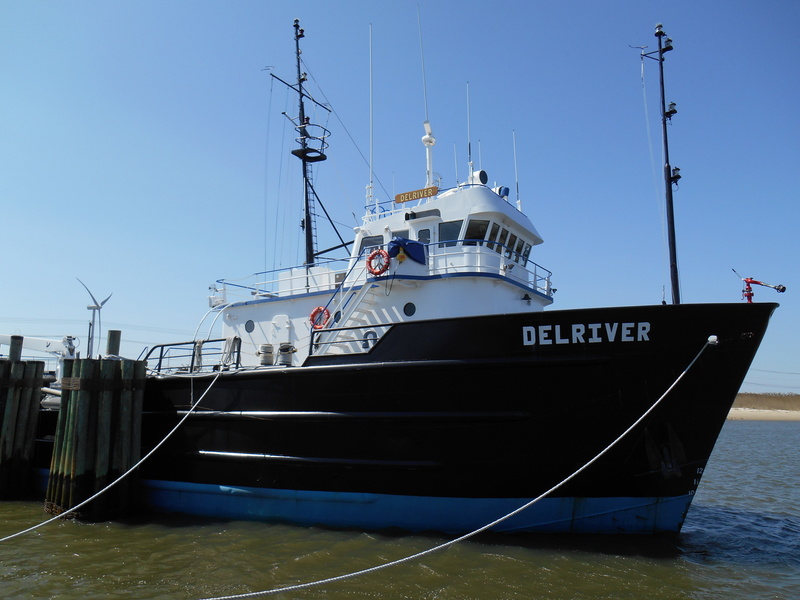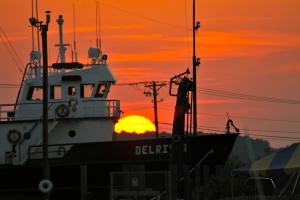For DelRiver, quiet days are good sign
Richard Gaudiosi says he has noticed a dramatic decline in oil tankers on Delaware waters.
But that doesn't mean oil spill recovery vessels, such as the DelRiver in Lewes, are no longer needed.
As the oil industry has shifted from transporting crude oil and oil products from water to rail, there's less traffic on the Delaware Bay – meaning less risk of oil spills.
“If you don't have fires, do you get rid of the fire department?” questioned Gaudiosi, the president of the Delaware Bay and River Cooperative, which operates the DelRiver and sister vessels. He said membership with DBRC is like an insurance policy for potential oil spills, even though fewer spills are occurring.
“There's this requirement for coverage, but the operators are very conscious about how they do their operation out there,” he said. “There's a lot more concern from the parent companies, the management companies, about spilling because it's bad for business and it's bad for the environment.”
The DelRiver was purchased in 1990 by the DBRC, a nonprofit organization funded by member companies that store, produce or transport petroleum products on the Delaware River and Bay.
|
166 feet long 2,000 horsepower with a normal speed of 12 knots 60,000 gallon fuel capacity 4,800 feet of ocean boom 3,000 barrel (126,000 gallons) storage capacity 13,750 barrels (577,500 gallons) per day recovery capacity All equipment can be deployed by the crew without outside assistance |
||||
The DelRiver, the largest of DBRC's fleet, is berthed in Lewes, across from the University of Delaware's Hugh R. Sharp Campus. Day and night, it is manned by a four-person crew that stays sharp with training exercises throughout the year and by closely caring for the former supply vessel.
It's been more than 10 years since the last major oil spill off Delaware waters. In November 2004, about 265,000 gallons of Venezuelan heavy crude oil spewed into the Delaware River after the single-hull tanker Athos I was punctured by a submerged pipe while on its way to a refinery in Paulsboro, N.J.
The DelRiver was one of many vessels that responded to the scene, using the ship's brush skimming system to separate oil from water and trap it within the vessel.
“You just have to be ready to go all the time,” said marine supervisor Scott Bossert, who has worked on the DelRiver since 1994. He said he remembers a time when significant spills occurred nearly every year. Now, with safety requirements such as double-hull vessels and other technologies, spills are less frequent.
Since the Athos spill, there have only been small leaks in Delaware waters, Bossert and Gaudiosi said. Bossert said the last response for the DelRiver was a small diesel spill in the bay in March 2014.
In 2012, about 400 oil ships lightered – meaning large tankers moved oil to smaller cargo ships – in the Delaware Bay, Gaudiosi said. He estimated about 100 oil tankers lightered on the Bay last year.
“But the risk doesn't go away,” he said. The most recent spill last year was the result of a lightering hose test malfunction.
Declining oil shipping raised concerns at the Caesar Rodney Institute, a conservative thinktank in Dover that feared reduced membership funding would result in decommissioning recovery vessels. DBRC is funded by its members and also receives funding from fees of subscribing members, which include the vessels that lighter in the bay but don't pay full-time membership dues. With the decline of vessels lightering at Big Stone Anchorage, subscribing member funding has decreased, raising concern that the DelRiver could be decommissioned.
“It's hard to predict what's going to happen in the oil industry,” said David Stevenson, director of the Caesar Rodney Institute's Center for Energy Competitiveness. “This is a really cheap insurance policy compared to the cost if there was a problem.”
However, Gaudiosi said DBRC members – including Sunoco Logistics, Delaware City Refining Co. and PSEG Nuclear LLC – have stepped up with a commitment to keep ships like the DelRiver in full operation. It's worth it for companies like the Delaware City refinery to pay a little extra to keep the DelRiver and other vessels on standby, Gaudiosi said.
“It's a large asset,” he said. “Once you let that asset go, it's going to be harder to get it back.”
Stevenson said future offshore drilling, now in exploratory phases off the mid-Atlantic coast, also could lead to spills. While a spill off Virginia's shore would more than likely travel south rather than north into Delaware waters because of currents, Gaudiosi said, the DelRiver and its crew are prepared to respond to an offshore spill.
At the land-based Delaware City Refining Co., which processes up to 190,000 barrels of oil per day – or nearly 8 million gallons – having a vessel like the DelRiver nearby is reassuring.
“The Delaware City Refinery supports the cooperative's commitment to continue providing reliable and effective spill response capabilities, which includes maintaining equipment,” said refinery spokeswoman Barbara Roehl.
Even though there has been a recent trend toward transporting domestic oil by rail, it's just not possible to transport the same quantity, Gaudiosi said. Rail transports will continue to be supplemented by high-volume shipping, he said.
“There's no way you can match the volume,” he said. He estimated that the average oil tanker coming into the Delaware Bay carries about 1 million barrels of oil, or about 42 million gallons, while one 100-car train's capacity is typically less than 3 million gallons in total, Bossert and Gaudiosi explained.
It's difficult to say what the future will hold for oil transports, Gaudiosi said, because of key factors including supply and demand, market trends, availability of suppliers and political influence on the international oil industry. And even though the long-awaited Delaware River main channel deepening project will increase the channel's depth by 5 feet, that's still not deep enough for full oil tankers to make it to Delaware City, New Jersey and Philadelphia ports, meaning lightering in the bay will continue, Gaudiosi said.
There is no crystal ball to predict the trends of oil transport in the future, Gaudiosi said, but there is one thing he can predict for the foreseeable future: The DelRiver will be ready when needed.
“The members are committed to keeping that vessel there and paying the cost associated with it,” Gaudiosi said. “And they're very happy not to see it go out. Nobody wants to have an oil spill. Nobody.”























































